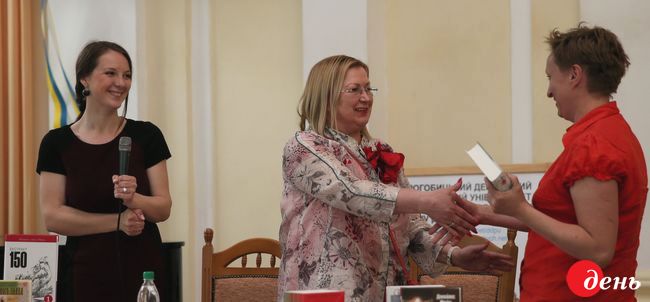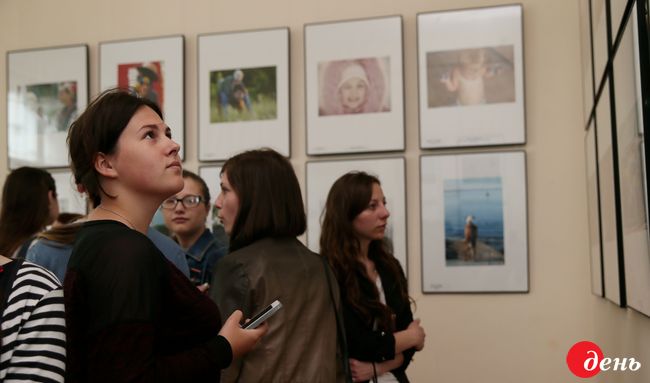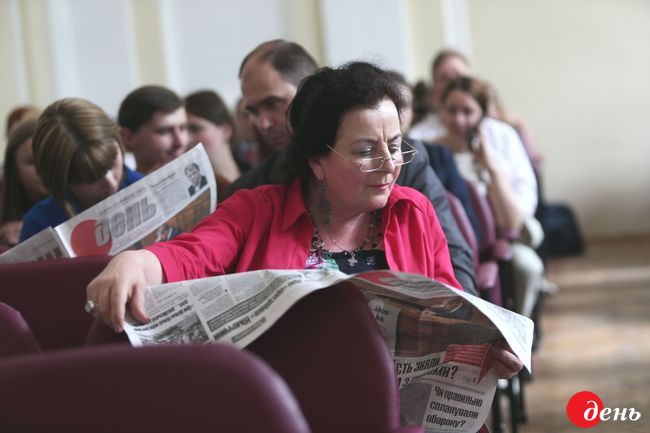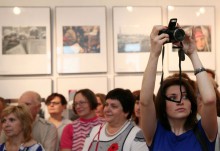There is a cultural “boom” in Drohobych. Europe Days and Den’s Days are being held at the same time. Alla HLADUN, director of the Drohobychchyna Museum, says the Den events are visited daily by groups of school and university students and teachers, as well as by many tourists from Poland and Germany, who came here to go on an excursion and to see the Europe celebrations.
“A small town like Drohobych badly needs a breath of fresh intellectual air,” says Roksolana BUIAK, presenter of the Caffeine program on Your Radio. Shortly before the photo exhibit was unveiled in the homeland of Ivan Franko and Yurii Kotermak, Larysa Ivshyna visited this breakfast show, where she said why Den had chosen no other place than Drohobych for an “intellectual mission.” “Having visited the Den Photo Exhibit, Drohobych residents remain virtually astonished by the profoundness of pictures and the exhibit’s emotional and artistic impact,” Buiak continues. “It is also very symbolic that Den’s Days have coincided in time with Europe Days – a European newspaper in a European city.”
Also in this spirit was Ms. Ivshyna’s intellectual debate with the learned community of Drohobych at Ivan Franko State Pedagogical University. They spoke about how to win. “This kind of debate is always an act of brainstorming, which makes it possible to single out and amply reconsider problems,” the university’s Rector Nadia SKOTNA says, sharing her impressions after a discussion in a crowded hall. “This helps understand better the vector of the future of the state and individuals. Meetings like this are extremely important, for they bring the newspaper closer to the reader and vice versa.” The university debate was about spiritual benchmarks, the political elite, mixed milieus, and the Maidan and post-Maidan events. The participants, who did not stint on analytical remarks and deep reflections during the debate, received a prize, Den’s Library books, from the newspaper’s editor-in-chief.
We offer our readers the most interesting points of the roundtable held in Drohobych on June 4.

Larysa IVSHYNA: “I spoke at the photo exhibit opening ceremony about the traditions of Magdeburg Law cities which also held education in high esteem. I always say on the eve of the Day of the Journalist that there is a very popular opinion that some newspapers are like advertising pillars. It occurred to me that Ukraine was short of the press in the figure of a Tree that would grow from the national soil, reach out for the world’s achievements, and bear original intellectual fruit, as befits a living tree. I had been expressing this idea for a long time, and then, by the efforts of our talented journalists, it became our obvious and stable image. For everybody can open this tree in the Internet and see the newspaper’s first issue or a description of our library.
“When asked why it is, of all places, Drohobych, I said that I felt there were our readers here. Sometimes, in the cities you’ve been invited to, there are a certain number of the interested people who want to raise quality but there are almost no readers. The quality press is not much read in this country. But in Drohobych we have contributors, readers, and like-minded people, which is in itself an invitation. My goal is, naturally, to have more readers. The best readers are those who read books and newspapers. It is interesting to monitor a website, but this won’t let us live a long life. And the habit to pay for your own is the first trait of a noble person. Unfortunately, this noble feature has been distorted in Ukrainian society for decades. Now we must get back to the norm, but this road is always hard.
“Whenever I begin to speak in Kyiv’s journalistic milieus about the necessity of a self-education and retraining crash course, they immediately start to wince. Why? Because they carved up their careers on a different ground. But this does not develop Ukrainian society. To be able to tackle difficult problems, we should have understood that integration into Europe required integration inside Ukraine at the very outset, which in turn requires a high ‘assemblage point.’ You can’t possibly put one region against another and say: strike a deal, guys. This ‘assemblage point,’ which can only be based on the processed knowledge of what is yours, precious, and gained through much suffering, must be put above anything else.”

Omelian VYSHNEVSKY, Ph.D. (Pedagogy), professor at the Department of General Pedagogy and Preschool Education: “A hybrid war obviously needs a hybrid victory. If we have thwarted Putin’s main dream – to establish an empire – it is a great victory of ours. Another victory in this war is that we have overpowered ourselves and showed ability to self-organize. I don’t think an empire can be conquered, but, God willing, all empires collapse. Can we win in the Donbas? With this in view, we must say that a little fire will simmer in the east until Russia disintegrates. But Europeans would like this to be a slow and controlled process. They are terribly afraid of something else.”
L.I.: “When I was forming the title of our meeting – ‘How We Can Win’ – I meant not only military strategies, but also a certain goal that could make Ukrainians mobilize their best forces. It is our global strategic goal. It was thought, for some reason: good or bad, but we have a state. And I felt as if we had a phantom-like situation in which Soviet property was being redistributed in a whirling motion and some decorative and ritual words were being pronounces – but there was not a single lever to put these productive forces into play. This was obviously leading us to a disastrous scenario.
“Besides, the war we are speaking about was personalized in a way, for in 1999 we were the only newspaper that opposed the reelection of Kuchma for a second term in office. The lineup of forces in this country and society has not changed much. That period projected a certain image of governance. All the first Maidan’s slogans were against Kuchma – everybody shouted: ‘Down with Kuchma!’ That was a protest against a certain style of governance which finally shaped an oligarchic clan state. Then came the second Maidan, and in spite of all the noble impulses, new characters, and strong public resistance, this Maidan in fact exonerated Kuchma. And none of the journalists has asked why this happened. This testifies to a weak political thinking.”
L.I.: “You know, sometimes a defeat is badly needed to bring some vital mechanisms into motion. I still said then that we would deal with society. So, the 1999 defeat helped our newspaper launch an intellectual library. To deal with society, one should clear historical ‘logjams’ and ponder over who and how will revive these senses so that we have a society of citizens. We blew the chance of having a proper leader because we were not duly prepared. This means it is citizens who should launch a new project. Incidentally, many readers of Den and our books, my students and journalists took part in the second Maidan.
“As for the first Maidan, I had no illusions at all. But still, Ukrainians are cardiocentric – they get easily carried away but do not think very deeply. I have two articles, one of which was serialized and published in our Extracts – ‘Identity and Modernization.’ Now it is time to write its third part – a direct answer to the question we are discussing. It should be titled ‘Modernization of the National Character.’ We will be able to win when we change. We will change when we analyze the traits that lead to a defeat. This must be done. I know a lot of countries, including Japan (the country I respect for its achievements), which assess from time to time the things that spoil their national character. Ukraine needs a feeling of new goals. But new goals are off the limits of traditional thinking. Whenever we discuss how we can win, we must set ourselves this exalted goal. The whole national character should be modernized with due account of an exalted goal. This means not only EU membership – this means regaining our historical matrix which we failed to appropriate and gave to our neighbors, often without any resistance. Putin has proclaimed 2015 the Year of Vladimir the Great, which shows that the ongoing struggle is not only for a territory, but also for a place in history. It is our No.1 task, and we are bound to change while fulfilling it. Hence, we will win.”

Lesia DIDYK, entrepreneur, public activist: “A newspaper issue on the Maidan really perplexed me. The front page carried the photo of a heap of children’s dolls. I was embarrassed, for I failed to fully understand the meaning of this. What did you mean by this?”
L.I.: “Since then, I’ve been expecting somebody to ask me this, and I must say you are the first to do so, although a lot of time has passed. Our photo exhibits are a real photo chronicle of this country. This picture was displayed at an exhibit well before the Maidan. This EU-flag-covered ordinary woman was photographed on Andriivsky Uzviz. She stood amid the stacks of multicolored dolls. I was not much touched by this at the time, but still this photo left some vague imprint on my mind. When the Maidan events began, it was clear from the previous political analysis that people were showing an absolutely motivated and passionate thirst for changes. But political spin was also evident. We were reluctant to admit this, but it was really so. I knew that this might happen, so we published this photo a day before the Maidan shooting. Even this attempt to warn about what could happen provoked no questions. None of my journalist colleagues asked me about this. A year later we put in this photo again and told its history to teach people to see not only what is ‘before,’ but also what is ‘after.’
“Why are we saying it is necessary to analyze political situations? During the Maidan, our editorial office held four roundtables with young activists who were asked: we will drive away Yanukovych, but what is your platform? Naturally, nobody was prepared. This unpreparedness let the ‘Maidan stage people’ take the initiative.
“It is not enough to chant ‘Down!’ ‘Shame!’ or ‘Glory!’ to express your civic protest – you must have an attitude and adhere to certain values. The next time public activists fathered at our place I asked if they were able to go to elections together. No. They dispersed among the parties, where the old experienced politicians practically absorbed them, for this supposedly ‘new blood’ does not exactly look very fresh.”
Vasyl FUTALA, Doctor of History, Drohobych Ivan Franko State Pedagogical University: “The question of how to win tormented more than one generation of Ukrainian intellectuals. And it is extremely painful today. I’d like to say a few complimentary to you, for your editorial board is making a colossal effort to win a victory. In my view, it is very important to form state-conscious elites. It has always been an extremely important problem – from the times of Khmelnytsky and Mazepa on to the 20th century. Russia was a hidden enemy. I subscribe to and keep some issues of your newspaper. Ihor Siundiukov prepared a superb publication on the Russian intellectual Alexander Herzen who said an interesting phrase, explaining Khmelnytsky’s action. He believed that our statesman gave in to the Russian tsar not because of love for Muscovy but because of hatred for Poland. Your efforts to educate a new political class and the state-conscious elite remain of paramount importance for this country and its citizens.”
L.I.: “We have assumed, to some extent, the unusual functions of a state. We have long been – as was the UPA – ‘an army without a state.’ Whenever asked about changes, I say there will be changes when parliament has a constitutional majority of the committed readers brought up on the principles Den adheres to. Meanwhile, the post-Maidan 2 situation is as follows: we’ve looked into why our newspaper is not in the parliamentary newsstand and, naturally, would like it to be there and catch the MPs’ eyes. We want our books to be read. To make my way there, I had to deliver a passionate speech about our newspaper’s humanitarian policy to two parliamentary committee chairmen.
“As for whether or not we are changing, I will tell you an interesting thing. The second president wanted recently to be member of Ukraine’s League of Painters… Only one artist voiced a vigorous protest – after the mass-scale heroism of Maidan 2. This artist was this kind of person before and during the Maidan, and I think he will remain as such until the end of his lifetime – with principles and attitudes. He stood with a poster that showed eyes and a caption: ‘I can see your deeds, man.’ You could see it in our album People of the Maidan. A Chronicle. We went through the Maidan – all of our journalists actively worked there, even though I wrote a preface to the album, which could have caused a shock at the time. I said I was against Maidans as a political method of solving problems. But we made this album to defend the honor of the Maidan people who came out perhaps without a constructive political program but still demonstrated very high standards of the Ukrainian people.”








